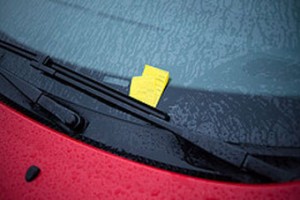
While things like oil taxes and education funding may get the most news coverage, every year the legislature passes plenty of bills that amount to housekeeping. Mostly, they do unexciting things, like cleaning up administrative code. And then sometimes, they lead to parking ticket holidays in cities across the state. APRN’s Alexandra Gutierrez reports.
This is a story of unintended consequences.
When the legislature took up a bill standardizing police-officer paperwork three years back, there wasn’t really talk of language requiring law enforcement to personally serve citations. Less explicit versions of that provision had been on the books since the 1980s, and the idea behind it is you want officers to get the right guys when they issue tickets for things like speeding or underage drinking.
“The Department of Law, the Department of Public Safety, the legislature were thinking about rules that apply across the state for when a police officer wrote you a citation face to face, and making sure that everybody got treated equally and fairly,” says Jesse Kiehl, a member of the Juneau Assembly. “They were not thinking about parking tickets.”
Juneau is just one of many cities across the state that lets the courts handle parking ticket appeals. But as of this month, the court system won’t bother with any case where an officer stuck a ticket under someone’s windshield wiper. They offered their interpretation of the statute in a rules order that went into effect April 15.
Kiehl says that a number of cities have been caught by surprise. That list includes Kenai, Sitka, Seward, and Valdez, to name a few.
“The concern that a whole lot of communities are going to have is that if a police officer or a parking officer — a meter reader — has to write a parking ticket, either they need to wait around for the vehicle owner to come back, or cities are going to have to scramble pretty fast here to change their laws and the way parking violations are treated.”
For a city to keep leaving parking tickets on cars, they’re going to have to work out appeals through a municipal parking authority or city administrator instead of directing any contested ticket to the court. Anchorage and Ketchikan already have systems like that in place, and Fairbanks issues civil fines instead of citations in most — but not all — cases.
To complicate matters, there isn’t any way to get an emergency exception to the personal service statute. The court order clarifying the matter went into effect just a day after the legislature gaveled out; lawmakers aren’t scheduled to come back until next January.
“It’s of those bureaucratic nightmare sort of things,” says Robin Koutchak, the city attorney for Sitka.
So if this bill passed three years ago, how did this issue fall through the cracks?
Rep. Mike Hawker carried the measure on behalf of the Department of Public Safety. He says his office wasn’t that involved in the drafting of the legislation, and that it didn’t spark any controversy when it went through committee. Nobody suggested it would require cities to rewrite their parking ordinances.
“Yeah, I don’t recall any anticipated problem there,” says Hawker. “You know, bills like that get heard. We’ve got a lot of good people in the legislature that look at them. But it appears that there was an unintended consequence of the language that was inside that bill.”
Hawker wonders why cities didn’t registered their concern over the law earlier. The court system had a long review period before making their rules official. Nancy Meade, who serves as their general counsel, says that notice of the rules change was sent on three separate occasions to police chiefs and city officials, along with every attorney in the state.
“It depends on how closely they read the e-mails, and I just don’t know, but apparently some missed it,” says Meade.
The Alaska Municipal League, which lobbies on behalf of the state’s cities, was also notified of how the rule would specifically affect parking tickets a month before the legislative session wrapped up.
With no easy fixes, many communities are in limbo until they change their laws to treat parking tickets as a civil fine, if they even want to do that. Kenai, for one, is worried that they’re going to have to dedicate more staff time to handling appeals.
“We’re in a spot where we may have to raise parking ticket fees to deal with that,” says Scott Bloom, Kenai’s city attorney. He adds that the city will probably have to start towing and booting more cars if there isn’t a fix before the summer season.
As far as Juneau goes, the city’s already drafting an ordinance that would make parking tickets a civil fine, but they’re limited in the ways they can enforce parking rules until that passes.
Kiehl says that’s not ideal, but he’s not expecting mass chaos.
“The republic will not fall,” Kiehl laughs. “People by and large will park and play nice and watch their two hours or whatever the rules are. Might some scofflaw take advantage? The possibility is always there, but I think we’ll deal with this as fast as we can, and I’m sure other cities will, too.”
agutierrez (at) alaskapublic (dot) org | 907.209.1799 | About Alexandra




